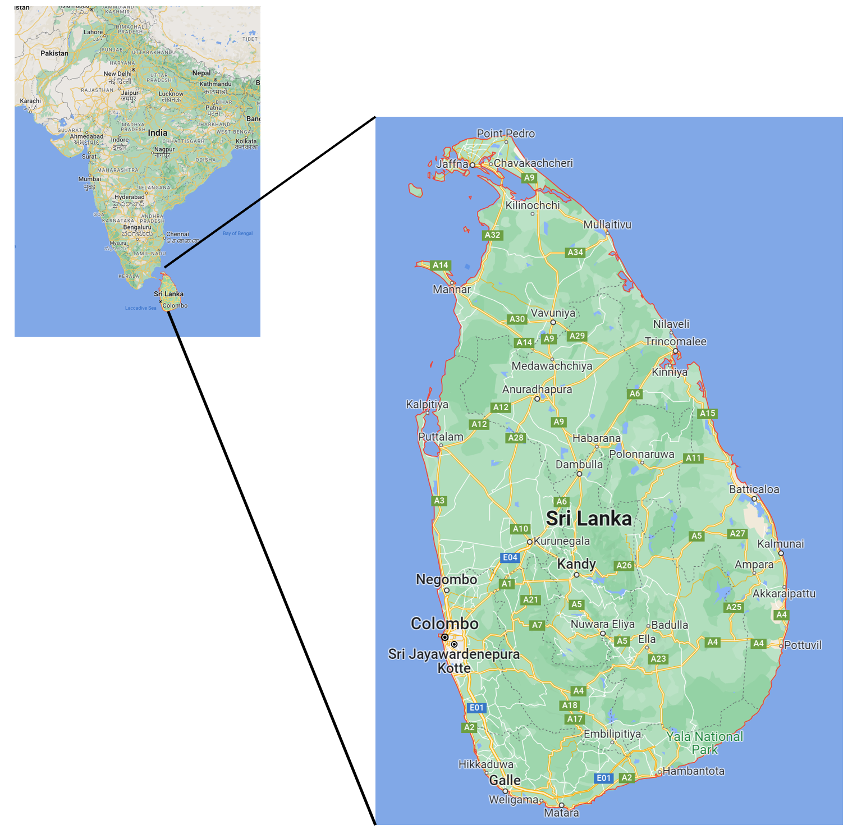Sri Lankan Meltdown
If you are like me, you may actually be too busy working on your own personal economy to pay attention as entire countries blowup their own. Why any country would contemplate destroying its own livelihood let own along carry it out is hard to grasp nonetheless it happens. One explanation is that leaders, with far too much emotion and far too little understanding of basic facts, apparently decide to embrace an ideology at the expense of an economy. You, dear reader, can, no doubt, construct other underlying explanations (e.g. corruption) but the root cause of the decisions are not nearly as interesting as the decisions themselves. It is far more instructive to examine the economic impact of a particular policy than it is to understand why such a policy was pursued in the first place.
Case in point: Sri Lanka.
Sri Lanka is an island nation tucked off of the south-east corner of southern India (individual map source: Google Maps).
The CIA Factbook on Sri Lanka lists it as home to approximately 23 million souls of mixed cultural descent (Sinhalese 74.9%, Sri Lankan Tamil 11.2%, Sri Lankan Moors 9.2%, Indian Tamil 4.2%, other 0.5%) with most of the original inhabitants believed to be from India. The island was controlled by the Portuguese and the Dutch in the 16th and 17th centuries, respectively, before being ceded to the British in 1796. It remained under British control for 152 years before gaining its independence, as the dominion of Ceylon, in 1948. The nation changed its name to The Democratic Socialist Repulic of Sri Lanka (or simply Sri Lanka) in 1972 when it transitioned from an independent country associated with Great Britain to a solely sovereign country. It has been mired in sectarian violence and civil war between the Sinhalese majority and Tamil separatists, to varying degrees, from this inception until the decisive victory of the government over the Liberation Tigers of Tamil Eelam (LTTE) in 2009.
Because of it location in the Indian Ocean, the island offers strategic value for maritime trade, which explains why it was highly sought after and contested for by the European powers in the 1600s and 1700s. Sadly, the promise of its location has not translated into prosperity. The problems with the economy are described, on the more diplomatic side in the NBC News article What is happening in Sri Lanka?, by Rhoda Kwan and Meredith Chen, as the worst economic situation the country has had to endure since it gained its independence from Great Britain. Other articles are more blunt and describe Sri Lanka’s economy using in the words of Sri Lanka’s latest Prime Minister Ranil Wickremesinghe as having collapsed.
So, just what went wrong?
There is no shortage of conjectures as to the root cause and explanations range from exploding foreign debt, to the dearth of tourism caused by COVID, to ill-advised tax cuts, to rising inflation, to out-of-control government spending, to collapsing currency, to political corruption and mismanagement. The article EXPLAINER: Why Sri Lanka's economy collapsed and what's next, by Krishan Francis and Elaine Kurtenbach of AP News, explores most of these points in greater depth.
Each of these factors have no doubt contributed to Sri Lanka’s economic crisis as either a root cause or an intermediate one but an compelling narrative suggests that the national economy had enough resilience to withstand the issues listed above and, instead, points to one key decision that served to bring down the whole house of cards. The critical decision was made by President Gotabaya Rajapaksa (part of the Rajapaksa governmental clan) in April of 2021 when he banned chemical fertilizer and forced Sri Lanka farmers to use organic methods. This policy had an almost immediate and disastrous effect or, as journalists Talal Rafi and Brian Wong put it in their article The Deep Roots of Sri Lanka’s Economic Crisis for the Diplomat:
Micaela Burrow, whose article ‘Complete Collapse’: Here’s How ESG Destroyed One Nation’s Economy appeared in the Daily Caller, agrees with this conclusion. Burrow quotes Peter Earle, described in the article as a economist at the American Institute for Economic Research as saying:
Burrow goes on to lay the roots of this decision with the government's aim to align with the ESG (environmental, social, and governance) movement stating that:
I find this argument compelling for two reasons. First, by most economic measures, in 2019, Sri Lanka had a growing and thriving economy that was in some ways on par with if not in front of the US. Even though the GDP of the island country was over 300 times smaller than that of the US, Sri Lanka’s per capita GDP to external debt was comparable (1.58 for Sri Lanka v. 1.25 for the US) or, correspondingly, its debt to GDP was 66.7% v. 81.9% for the US. The growth rate of the two countries was also about the same at around 2% (most statistics obtained from MacroTrends with the exception of US debt which came from Peter G. Peterson Foundation). Based on these data there was no reason to believe that Sri Lanka would not have weathered the storm cause by COVID just as the US has; no reason except an incredibly stupid decision that, even if firmly believed to be based on a sound principle, should have been deferred until the world had again normalized.
The second reason is psychological in nature. Leaders in almost every form of government rarely feel the pain they inflict on everyone else and so they make easy prey to peer pressure and virtue-signaling lobbying. Being charitable, I suppose that is was the desire to be thought of as sophisticated and worldly that led the Sri Lankan leaders to embrace a radical change in their economy just when so many other changes had already been forced on them due to COVID. I guess the famous sentiment of the character Mona Lisa Vito (played wonderfully by Marisa Tomei in My Cousin Vinny)
never occurred to them.

